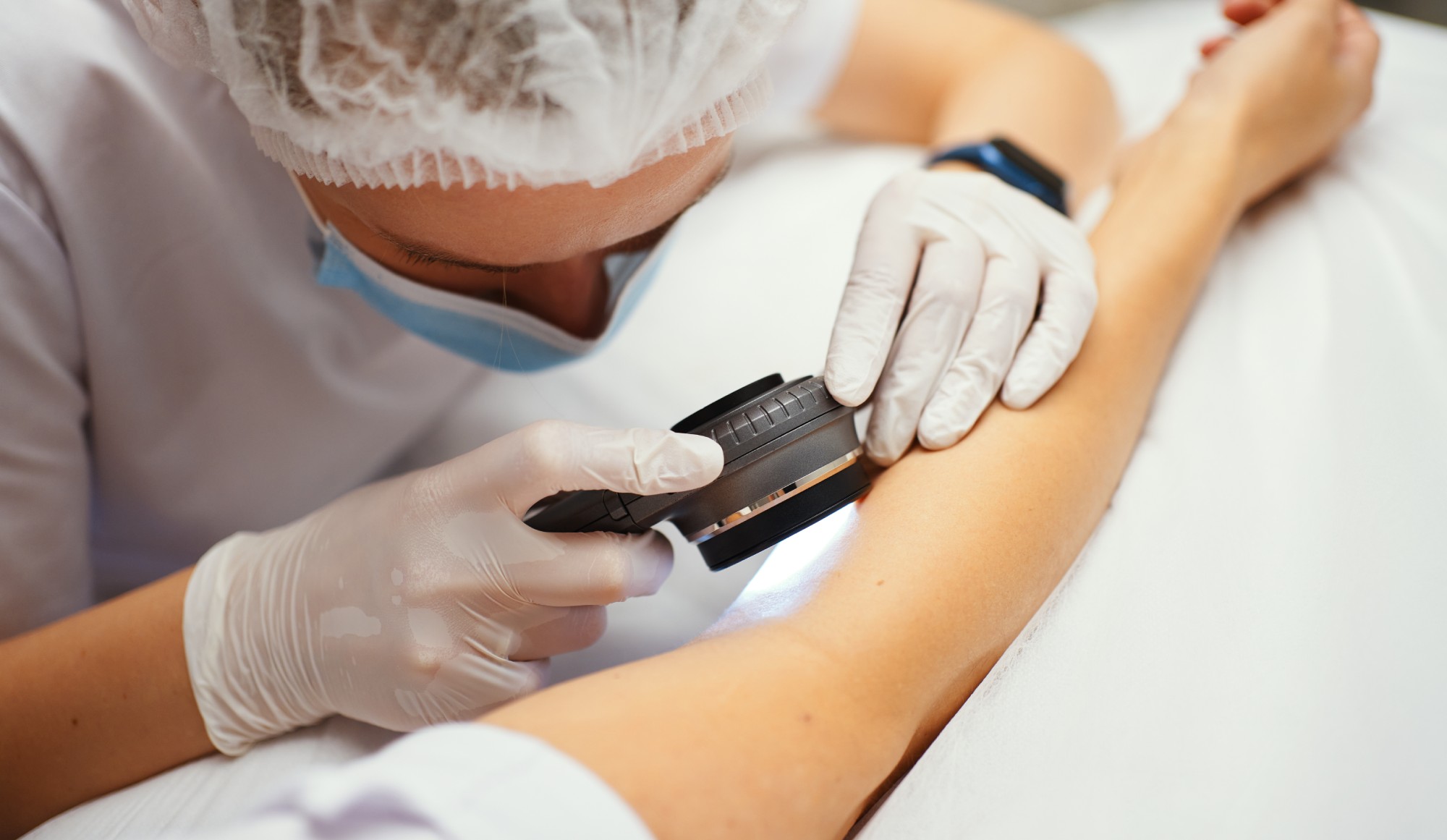
Medically Reviewed by Dr. Lee Hwee Chyen
MBBS MRCP (UK) FAMS (Dermatology)

Eczema and psoriasis, both inflammatory skin conditions, can be mistaken for one another because of their similar symptoms.
Eczema (atopic dermatitis) typically starts in childhood and presents as red, itchy, and inflamed skin. It usually appears in body folds like elbows and knees due to the presence of allergens, irritants, temperature changes, stress, genetic factors and irritation from certain fabrics.
Psoriasis, an autoimmune condition, leads to a rapid build-up of skin cells, which can cause thick scales and red patches. It can start at any age and often manifests on the scalp, knees, and elbows. Triggers include stress, infections, certain medications, and skin injury.
While both conditions share symptoms like red, inflamed skin, they differ in several key aspects that help dermatologists diagnose both conditions distinctively.
Eczema is characterized by red, itchy patches that may ooze and crust. This is indicative of a compromised skin barrier, leading to a greater susceptibility to environmental irritants and allergens. The skin affected by eczema is usually dry and scaly, and these areas can become thickened over time from chronic skin irritation and scratching.
Psoriasis presents with thick, raised, silvery-white scales on red patches or plaques caused by an increased rate of skin cell turnover. This rapid proliferation of skin cells can lead to the formation of painful plaques which may crack and bleed.
Dysfunction of the skin barrier usually causes eczema as there is increased skin permeability and vulnerability to irritants and allergens. This is compounded by an overactive immune response that contributes to inflammation and itching. Some individuals suffering from eczema also have a family history of the condition itself.
Psoriasis is an overactive immune system which causes a rapid build-up of autoimmune disorder where the immune system mistakenly targets healthy skin cells. This misguided immune response triggers the rapid growth of skin cells and inflammation, leading to the development of psoriatic plaques.
In summary, psoriasis is caused by a dysfunction in the immune system while eczema is related to allergic and atopic conditions.
Eczema commonly occurs in areas where the skin folds, such as the inner elbows, behind the knees, and the neck. These areas are prone to irritation and sweating, which can exacerbate the symptoms of eczema. In infants, eczema often appears on the face and scalp.
Psoriasis, however, typically manifests on the outer surfaces of joints, such as the elbows and knees, as well as the scalp, lower back, and nails.
Intense itching is a characteristic of eczema and can be severe enough to disrupt sleep and daily activities. The itch in eczema is a result of skin inflammation and the release of various inflammatory mediators in the skin. Scratching the itchy areas can lead to a vicious cycle of itching and scratching, known as the itch-scratch cycle, which can worsen the eczema.
Typically, there is less severe itching in individuals with psoriasis compared to those with eczema. The itching in psoriasis is often a result of the dryness and scaling of the skin, and it is not as central to the condition as it is in eczema.
Childhood is often the period when eczema begins. Many affected children have a personal or family history of other atopic conditions like asthma or hay fever.
Psoriasis can develop at any age, with two common onset periods being in late adolescence and between the 50s and 60s.
Eczema can lead to symptoms such as blistering, oozing, and crusting, especially during acute flare-ups. Chronic eczema can result in lichenification, where the skin becomes thickened and leathery due to ongoing swelling and scratching.
In addition to skin symptoms, psoriasis can have systemic manifestations. Nail changes such as pitting, discolouration, and separation from the nail bed are common in psoriasis. Many individuals with psoriasis develop psoriatic arthritis, which can cause joint pain and stiffness.
The accurate diagnosis of psoriasis and eczema helps guide dermatologists in planning effective treatments for their patients. While these conditions have some similarities in symptoms, their diagnosis relies on distinct clinical features.
A skin biopsy involves the surgical removal of a small sample of skin tissue for microscopic examination, allowing for the identification of diseases that may not be discernible through visual inspection alone. Read on to learn more.
Many wonder whether eczema can resolve without treatment. The answer depends on the individual's type of eczema, age, environmental factors, and overall health status. Read on to learn more about eczema and the appropriate management strategies for this condition.
Eczema affects individuals worldwide and can significantly impact daily life. Read on to learn more about common triggers for eczema flare-ups, and strategies and treatments that may help manage these flare-ups.